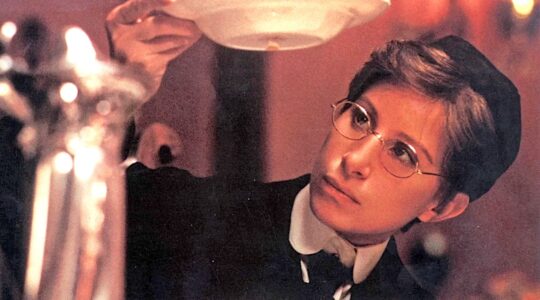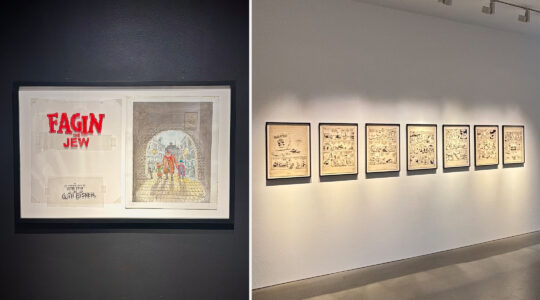This year’s edition of the Other Israel Film Festival is the 10th and, given the original focus of the event on the faces and stories of “other” Israelis — those not directly entwined in the ongoing conflict — one wouldn’t have expected it to survive for a decade. However, the festival’s programmers have proven too canny and too film-savvy to be limited to an agenda that would have meant a brief lifespan.
This year’s festival stakes out a familiar thematic ground, with numerous films limning the tensions within the nuclear family and the often negative impact of the conflict on more intimate pressures.
It is undoubtedly a mark of how totally normalized the connection between the personal and the political is in Israel that several of this year’s fiction features are based around a completely relaxed balance in which family melodrama or comedy integrates seamlessly into current events.
Take, for example, the festival’s closing-night film, “Personal Affairs.” A deft, witty comedy about the daily grind of bad habits, “Affairs” marks a splendid feature debut for Maha Haj. Haj’s previous credits include set decoration on Elia Suleiman’s “The Time That Remains”; Suleiman is thanked in the end credits to the new film, and Haj shares Suleiman’s deadpan comic style and his sense of the absurd.
She also shares his fascination with the way that obsessive behavior rules our daily lives. Her characters are prisoners of habit, with both salubrious and not-so-happy results. Saleh and Nabila (Mahmoud and Sanaa Shawahdeh) are an older married couple whose relationship long ago was reduced to a series of stare-downs; he reads aloud from innocuous news items found on his laptop while drinking uncountable cups of coffee, she knits and falls asleep in front of her favorite soap operas. When they go to visit their son Hisham (Ziad Bakri), who lives in Stockholm, they simply repeat those routines, with the nearly irrelevant difference that the soap opera Nabila sleeps through is in Swedish. Their other son, Tareq (Duraid Liddawi), is a perpetual bachelor caught in a flickering relationship with Maisa (Maisa Abd-Elhadi), who is trying to force him to commit. When she takes her most defiant stance at a checkpoint, it seems as if the film is taking a very dark turn, but like the specter of the Depression in a Hollywood screwball comedy of that era, the occupation works as a double-edged blade, simultaneously sinister and absurd.
“Personal Affairs” is astonishingly assured in tone, an absolute necessity for a film that works close to the edge of sitcom foolishness. Haj’s dry tone and visual rigor sweep aside one’s reservations while simultaneously allowing real feeling to shine through. I doubt if there will be a more satisfying moment in a film this year than the one in which George (Amer Hlehel), the amiable, childlike son-in-law, gets his first-ever look at the sea. For a first-timer to pull off such a difficult but deeply rewarding balance as “Personal Affairs” is a delightful surprise.
Eran Kolirin managed a similar, albeit more bittersweet, version of that tonal juggling act in his first feature, “The Band’s Visit.” His latest film, “Beyond the Mountains and Hills,” is his third, a family drama about newly retired Lt. Col. David Greenbaum (Alon Pdut), his struggle to find a place back in civilian life, his wife Rina (Shiri Nadav Naor), a high-school literature teacher going through her own midlife crisis, and their teenage children Yifat (Mili Eshet) and Omri (Noam Imber) who are battling the usual mix of social anxiety and hormones.
The opening night film, “Harmonia,” is a modern retelling of the Abraham-Sarah-Hagar triangle. Courtesy of Go2Films
Kolirin tries mightily to make their problems into a sort of overview of Israeli society mid-decade. David drifts into a diet supplement marketing scheme, Rina has a disastrous affair with a student and Yifat befriends an older Palestinian with seemingly innocent intentions. At first, the film swivels smoothly among these disparate story lines, but gradually, Kolirin seems to lose interest in David’s moral qualms and shifts his attention to the women. For a while that seems to work but when the writer-director decides to involve his male protagonist in Yifat’s dilemma the result is unsatisfying, and a decision to bring Omri, almost absent from most of the proceedings, into a key moment in Rina’s storyline feels forced and arbitrary.
Kolirin has not lost his feeling for actors nor his ability to use a long silent take to explore a troubled and complicated emotional current in his story, but “Beyond the Mountains and Hills” is a disappointment, albeit a worthy one.
Kolirin got his start on the Israeli TV series “Shabbatot VeHagim,” (“Shabbat and Holidays”) for which he frequently served as both writer and director. The lead writer on that series was Ori Sivan, who also created “In Therapy” and its English adaptation, “In Treatment.” Sivan is represented in this year’s festival by the opening night film “Harmonia,” an ambitious attempt to retell the story of the Abraham-Sarah-Hagar triangle as a modern story set in the classical music world.
The “slow cinema” paradigm — long takes, languorous camera movements, lengthy silences — is becoming one of the default settings for international art cinema, and “Harmonia,” like several other films in this year’s festival, nibbles at the edges of that aesthetic intelligently.
On the other hand, the filmmaker who Sivan reminds one of most frequently is Ingmar Bergman. As in late Bergman, there is certain hothouse air to his triangular melodrama, intensified by an occasionally heavy-handed use of red and yellow as the principle hues in the film’s palette. More problematic, though, is the film’s structure, which relies rather too closely on the episodic, fragmented biblical narrative line. There are gaps in the chronology that leave too many questions for an audience to fill in with too few clues, and the ending, a musical feel-good fusion that reunites the story’s two half-brothers, feels arbitrary, almost trivial.
The Other Israel Film Festival runs Dec. 1-8. Most of the films will be screened at JCC Manhattan (76th Street and Amsterdam Avenue); otherisrael.org.
The New York Jewish Week brings you the stories behind the headlines, keeping you connected to Jewish life in New York. Help sustain the reporting you trust by donating today.




